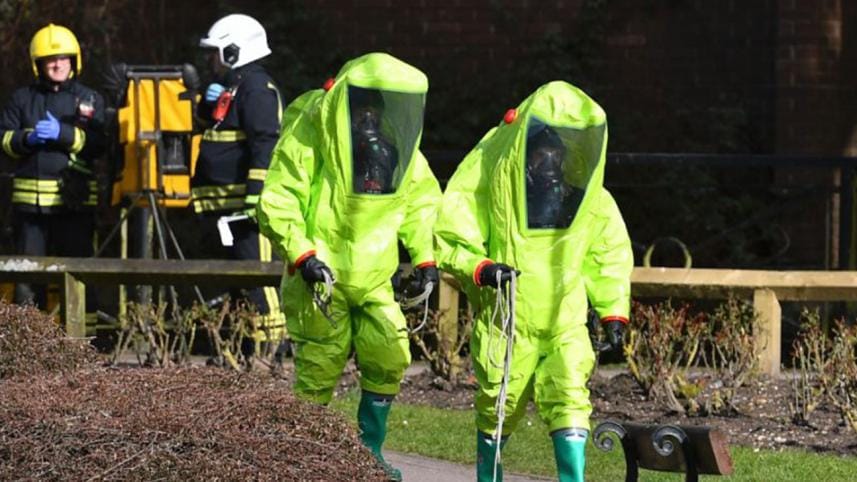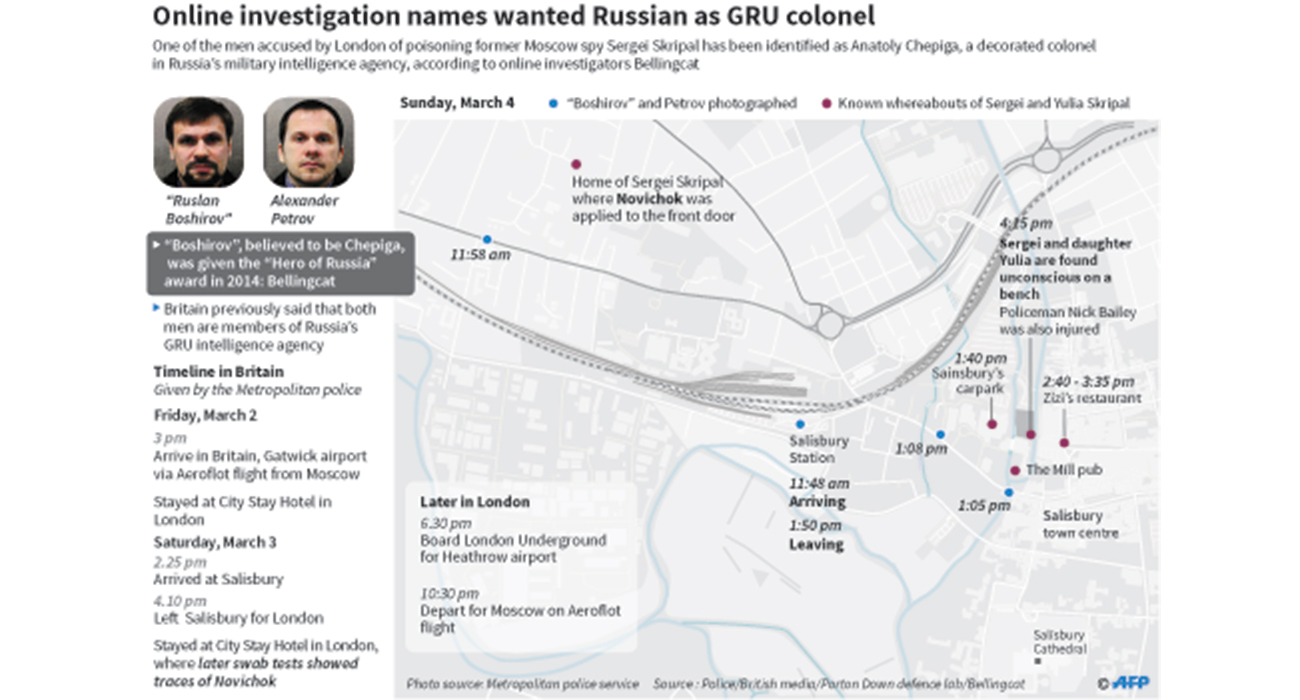EU sanctions Russia military intel chief over Skripal

The European Union slapped sanctions on the two most senior officers in Russian military intelligence yesterday and identified the two agents accused by Britain of carrying out a chemical attack.
Along with the measures against the four GRU officers, EU member states also imposed asset freezes and travel bans on five Syrians linked to strongman Bashar al-Assad's chemical weapons program.
The EU accused the Russians -- two agents and the head and the deputy head of the GRU -- of orchestrating the "possession, transport and use" of the nerve agent used in Salisbury, England last March, in a failed attempt to assassinate a defector.
The agents are accused of travelling under the pseudonyms Alexander Petrov and Ruslan Boshirov, but the sanctions order confirms reports that identify them as Anatoly Chepiga and Alexander Mishkin, both 39 years old.
These identities had previously been revealed by the British-based Bellingcat investigative group, which pieced together evidence from leaks and online data trails to find two decorated GRU field officers.
Their listing was expected, but the decision to target the GRU leadership -- identified as agency chief Igor Kostyukov and his first deputy Vladimir Alexseyev -- ups the stakes in the dispute.
"This decision contributes to the EU's efforts to counter the proliferation and use of chemical weapons which poses a serious threat to international security," a statement said, after EU foreign ministers met.
"I'm confident member states took the decision on a very strong legal basis," said EU foreign policy chief Federica Mogherini, stressing that the measure would "resist the tests of the courts".
British Foreign Secretary Jeremy Hunt welcomed the decision, the first under a new EU sanctions regime focused on halting the use and spread of banned chemical weapons.
"Today's new sanctions deliver on our vow to take tough action against the reckless and irresponsible activities of the Russian military intelligence organisation, the GRU," he said.
Russia threatens retaliation
The Russian foreign ministry reacted angrily, insisting that the claims against its personnel had been invented by Britain for its own diplomatic ends.
"We reserve the right to take retaliatory measures over this unfriendly step," the ministry said in a statement.
"An information campaign unleashed by the British authorities over this case primarily has a domestic agenda. It is telling that its new round coincides with a new crisis in Brexit talks."
Russian agents have been blamed for the poisoning of former Russian spy Sergei Skripal and his daughter in Salisbury in March last year using the Soviet-developed nerve agent Novichok.
The Salisbury attack, the first offensive use of chemical weapons in Europe since World War II, caused an international outcry and prompted a mass expulsion of Russian diplomats by Western nations.
The Skripals survived the attack but a British woman died in June after her partner picked up a discarded perfume bottle that investigators believe was used to carry the Novichok.
Moscow denies involvement in the poisoning and has offered numerous and varied alternative explanations and counter-accusations.
Before the sanctions were announced, Kremlin spokesman had brushed aside reports that "Petrov" and "Boshirov" would be targeted.
"They are under suspicion for no good reason," he said, insisting images published by British authorities of the pair visiting the UK at the time of the attack did not prove anything.
"There are a lot of pictures of Russian nationals in the UK and this is not direct evidence. We don't know of any more substantial and more concrete evidence, therefore we treat such decisions negatively."
The Syrian sanctions hit the Scientific Studies and Research Centre (SSRC) and Colonel Tariq Yasmina, SSRC head Khaled Nasri, Walid Zughaid, Colonel Firas Ahmed and Said Said.
Yasmima is alleged to be the liaison between the SSRC and Assad's palace, and the others are said to be senior weapons development and production personnel.



 For all latest news, follow The Daily Star's Google News channel.
For all latest news, follow The Daily Star's Google News channel. 
Comments